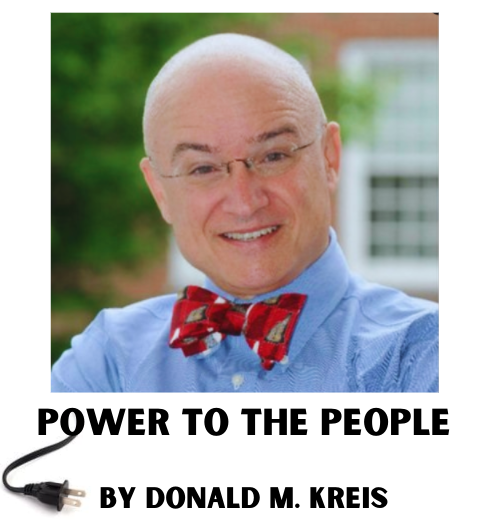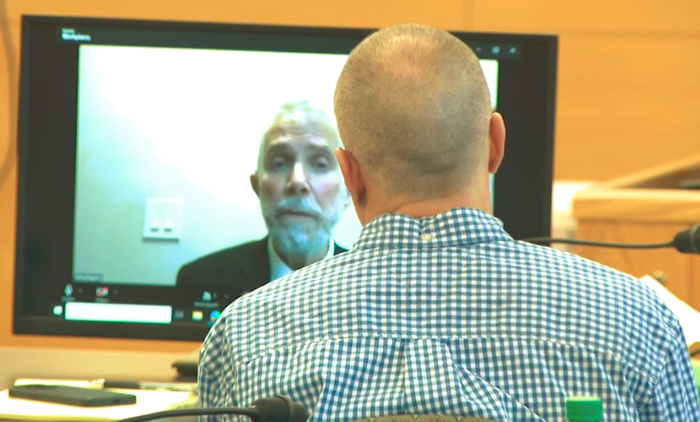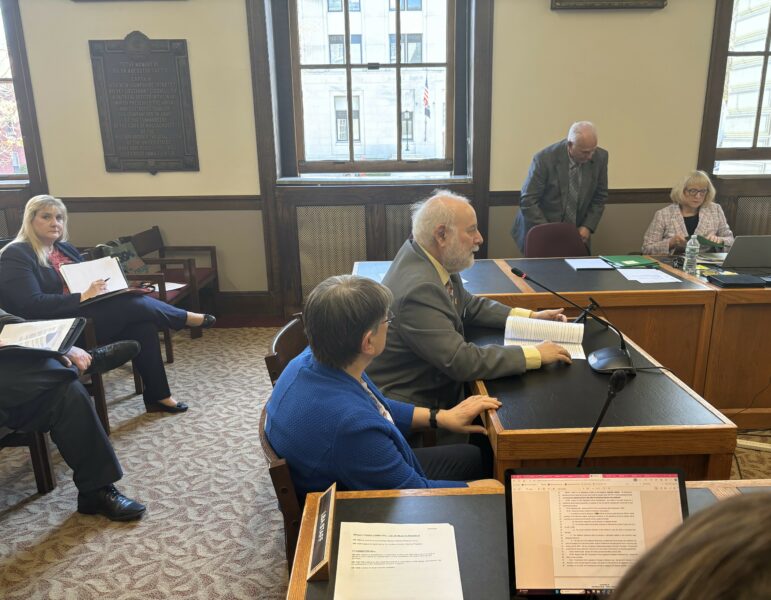Power to the People is a column by Donald M. Kreis, New Hampshire’s Consumer Advocate. Kreis and his staff of four represent the interests of residential utility customers before the NH Public Utilities Commission and elsewhere.
By DONALD M. KREIS, Power to the People
Driving through Moultonborough on Route 25 the other day, I came across a remarkable sight: a yard sign.
Yard signs along busy highways like Route 25, of course, are as common as dandelions in springtime. But they, too, have a season: right before primary day and election day. This isn’t election season.
Except it is, if you are fortunate enough to have the New Hampshire Electric Cooperative as your electric utility. The yard sign in question advertised two candidates for election to the Electric Co-op’s board of directors.
Electricity is really important – it’s an essential commodity these days, and it has grown notably expensive over the past couple of years. Ergo, the annual election at the Electric Co-op is important.
Our other electric utilities — Eversource, Liberty, and Unitil – are investor-owned companies whose purpose, no matter what they tell you, is to extract as much profit as possible for their shareholders.
So we have a Public Utilities Commission (PUC) to make sure their rates are reasonable and we have a Consumer Advocate (i.e., me) to throw a little weight on the scale in favor of customers.
But the New Hampshire Electric Cooperative is different. It’s owned by its 86,000 customers – there are no profit-extracting shareholders – and, ostensibly, the Co-op is democratically controlled by those customers (referred to in co-op speak as “members”) with little or no PUC oversight.
I use the word “ostensibly” because this democratic member control thing – a hallowed principle for cooperatives the world over – presupposes member involvement and vigilance. When co-op members don’t vote in their annual board election then their board becomes self-perpetuating and unaccountable.
An electric utility whose top governing body is self-perpetuating and accountable to nobody? What an awful idea. Just ask the members of the Pedernales Electric Co-op in Texas who, in 2007, watched their electric utility engulf itself in scandal because the members were not paying sufficient attention.
Fortunately that’s not the way things have gone down at the New Hampshire Electric Cooperative. This year in particular, the annual board election appears to have attracted a laudable amount of avid member interest.
The Electric Co-op seems to have triggered a lively election itself, although you have to read between the lines on the Co-op’s web site to figure it out. The Co-op board’s nominating committee took the unusual step of deciding not to recommend two incumbent board members for reelection.
Not coincidentally, they are the very two people whose names appeared on that yard sign I saw in Moultonborough. The Co-op’s bylaws allow candidates not endorsed by the nominating committee to get on the ballot if they get signatures from 100 members. That’s what these two incumbents did.
You are not going to read their names, or those of anyone else standing for election to the New Hampshire Electric Co-op board, in this column.
However, it’s noteworthy that two incumbent candidates spurned by the nominating committee have enemies. Indeed, their enemies were motivated enough to create an anonymous web site in an effort to campaign for the duo’s defeat.
Before I comment on that web site, I have a deep-seated bias to confess. I’ve been actively involved in the cooperative movement for 20 years, most notably the 11 years I spent as a director of the nation’s second biggest cooperative grocer (New Hampshire’s own Hanover Consumer Cooperative Society).
So, I am a true believer in the Cooperative values and principles. When the cooperative movement was born 179 years ago in England, the world got a compelling alternative to business as usual. It was the original socially conscious investing.
The “ethical values” listed in the “Statement on the Cooperative Identity” of the International Cooperative Alliance” are “honesty, openness, social responsibility and caring for others.” In other words, the very opposite of the way far too many political campaigns go these days.
Which is why it is disappointing to see an election at the New Hampshire Electric Cooperative go down that low road of so many political campaigns.
The anonymous web site in question castigates the two candidates for claiming to be “fighting for lower rates” while “their voting record says otherwise.” Certain votes they cast in favor of proposed rate increases are then listed.
This is unfair. It’s true that the Electric Co-op Board approves the utility’s rates, much as the PUC does for the IOUs (investor-owned utilities). But in most if not all instances, the directors have no alternative but to bless the increases unless they want to see their utility become insolvent. The two directors were hardly alone in supporting the rate increases.
Moreover, the web site fails to consider the Electric Co-op’s rates in their proper context. Electricity rates soared throughout the region in 2021 and 2022. The Co-op’s 13 cent default energy service rate is the lowest in New Hampshire and puts the IOUs to shame.
Next the web site accuses its two targets of “lining their own pockets with tens of thousands of member dollars each year” because, like every other director at the Electric Cooperative, they receive a stipend for their service. But co-op directors deserve at least some compensation for the extensive work they put in; that’s the long and short of it.
Alas, the unnamed authors of this web site thereby squander their credibility well before they get to the third issue they raise – the claim that the two candidates in question “have contributed to a hostile working environment, which has resulted in the voluntary turnover of nearly every single senior executive, including [the] CEO, over the past three years.”
“The board itself is not immune from the rampant toxicity,” the web site continues, noting that “former director Daniel Senie cited the ‘toxicity of the board dynamics and the hostile work environment” in the resignation letter he tendered last year.”
This concern, unlike the others on the web site, deserves to be taken seriously.
I have learned the hard way, through long and bitter experience, about how to be an effective cooperative director. If you cannot work in a collegial manner with your fellow directors – even ones with whom you disagree vehemently – then your vision for how to make your cooperative great means absolutely nothing.
Since I have never been to a meeting of the board of the New Hampshire Electric Cooperative, it is not for me to say whether this kind of toxicity is affecting the governance of our most enlightened and evolved public utility. I’ll just say that the election runs through June 1 – and, if you are an Electric Co-op member who hasn’t voted, you should cast your ballot immediately according to the instructions mailed to you.





